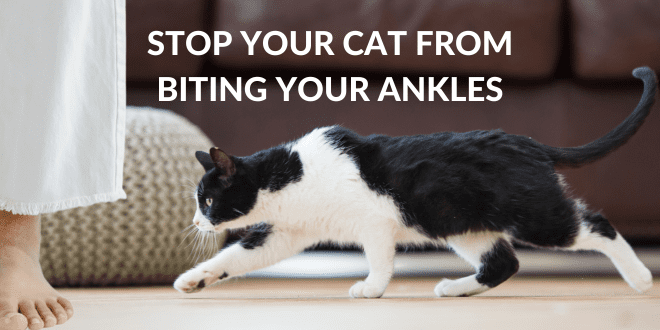
Listen to the audio version of this article

Does this describe your home? You get up out of bed and start walking to the bathroom, only to have your ankles become the target of a cat attack. Does your cat hide under the bed until the moment when she sees your bare feet hit the floor and then she sinks her teeth or claws into your flesh? Perhaps your cat waits around the corner for that moment when you walk down the hallway and then she launches into a perfectly timed ankle attack. Is there a solution? Yes.
Your Cat’s Ankle Attraction
The reason your cat targets your ankles is because they’re a moving target and if there’s no other option for play or stimulation, the cat will focus on what’s currently available. The prey-drive is triggered by objects moving across or away from the cat’s visual field. If your cat isn’t getting adequate stimulation and playtime opportunities through interactive play therapy or adequate environmental enrichment then she’s going to take it upon herself to find a substitute. Unfortunately, that substitute is a painful one to the human family member.
Increase the Fun Factor for Your Cat
In order to stop the ankle attacks you need to provide the cat with a better option and that comes in the form of playtime opportunities with appropriate toys. You’ll do this in two ways. First, set up a schedule of doing interactive play therapy on a daily basis. Use a fishing pole-type toy so you can mimic the movements of prey. The fishing pole toy also puts a distance between your skin and the cat’s teeth so it teaches the cat what is an acceptable target. Since cats would have several opportunities to hunt in an outdoor setting, schedule at least two interactive play sessions per day.
Next on the list is to increase the fun factor in the overall environment. This will enable your cat to have opportunities for playtime even when you aren’t home. Use puzzle feeders for your cat so she’ll have lots of chances to “work” for food. Puzzle feeders provide cats with a natural progression of the hunt and the reward. You can also rotate your cat’s regular toys so they don’t become boring. Take a long look at the types of solo toys you’ve bought and see if they could use some improvement. A fuzzy ball is boring when it’s sitting in the toy basket but if you place it inside of an open paper bag that on its side on the floor then you’ve increased the fun factor.
There are many ways to increase environmental enrichment in your home so that your ankles are no longer the most appealing target. Use your imagination and create homemade puzzles and toys. Set up a cat tree by a window. Install a bird feeder outside. Use a “think like a cat” approach to looking at the environment from a cat’s point of view. Is it a boring environment? If so, then it’s time to roll up your sleeves and add some fun into your cat’s life.
How to Handle an Ankle Attack From Your Cat
If your cat has her paws wrapped around your ankle and her teeth are sinking into your skin, what’s the best thing to do? One thing you shouldn’t do is run or pull away because that will often only result in the cat biting down harder. Prey moves away so don’t act like prey when you’re bitten. Instead, confuse your cat by gently pushing toward her. This will often cause her to release her grasp because no self-respecting prey willingly heads toward the predator. Once the cat releases her grasp, stay still and ignore her. She’ll soon learn that biting flesh results in an immediate end to the fun.
Need More Information?
For more specifics on play therapy and how to use toys for behavior modification and correcting cat behavior problems, refer to the books by best-selling author Pam Johnson-Bennett. Pam’s books are available at bookstores and online. We’ve included links to Amazon on our website.
If you have a question about your cat’s behavior or health, contact your veterinarian. This article is not intended as a medical diagnosis nor is it a replacement for your cat’s regular veterinary care. This article is for general information purposes only.




